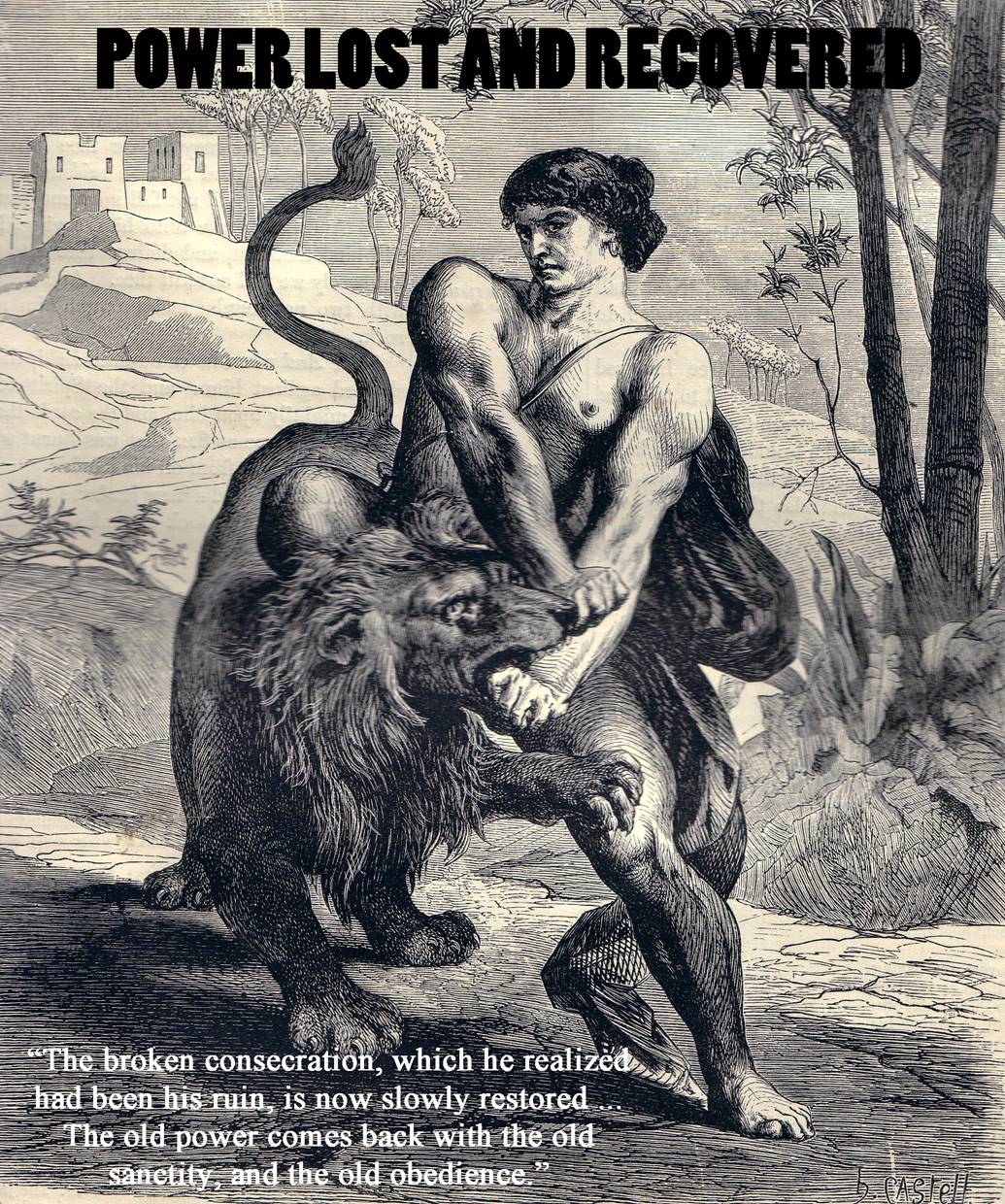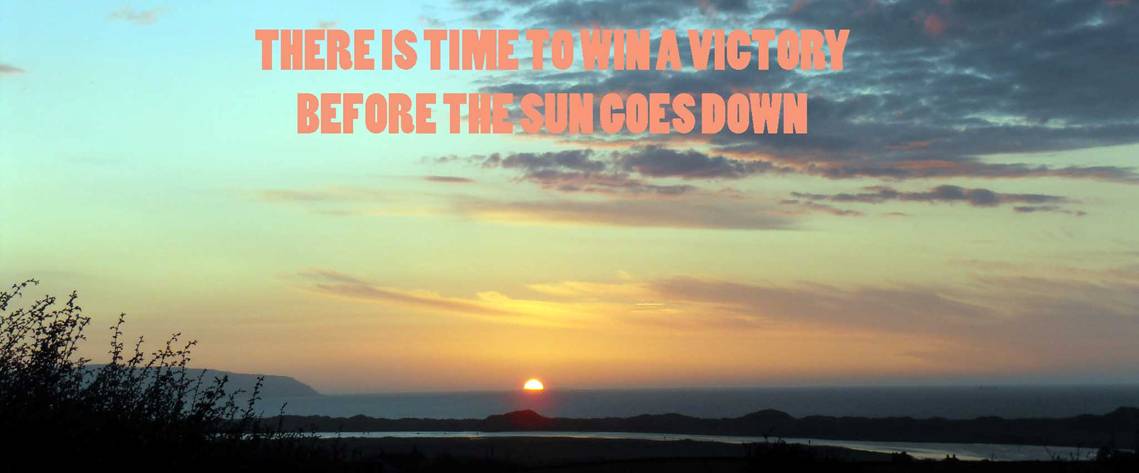
By D. M. PANTON, M. A.
A constant phase
of today is the going down of leader after leader into a bankruptcy of power,
or even into complete spiritual extinction: something hidden perhaps, of which none
knows the secret but God, and there is a sudden fading of the old splendid
glow. So Samson is perhaps the most
vivid example in the Bible of giant power, accompanied by an utter
unconsciousness of danger - always the greatest danger of all - sinking in a
moment into total moral bankruptcy.
Samson is an example etched in lightnings of what all of us may
become: at first a spiritual giant; a doer of exploits vivid, dashing,
marvellous; a solitary hero dominating a nation; a lonely warrior of God in his
race and generation: then, a secret passion; a fearful public collapse; and
only in the far sunset, a going out in a sudden burst of the old splendid
power, after years of lost vision (the eyes put out) and a manacled life.
Samson is the
summary of power resting on consecration; and his huge muscular strength is the
Old Testament counterpart of spiritual dynamic in the New. For Samson was not born strong: apart from
the Spirit of God his stature was no more colossal, nor his muscle iron, than
any other man’s; but with him the on-fall of the Spirit was such, as was the
clothing of the human with the naked power of the Holy Ghost, that one man - and that man unarmed
- could rout three thousand. And the symbolism is extraordinarily
striking. Unshorn locks falling down picture the descent of the Spirit, drenching
him as the sacred Oil did Aaron; seven
locks (Judges 16: 19), the plenitude of
power; and locks untouchable, as the God-given symbol of his Nazarite
consecration and the sole secret of his strength. The Nazarite who put a razor to his head knew
that he had lost his consecration. ‘Nazarite’ means ‘separated,’
separated to God, a man whose power
dwells solely in his separation; and the power remains so long as
(contact with a corpse being forbidden) he
is ‘out of touch’ with a dead world.
And the name ‘Samson’ means ‘the sun,’ or strength - the sun as it shineth in its strength; the chief receptacle and
transmitter of the Light of the World.* So
Samson was no mere prodigy of brute
force, but, as a unique example of Holy Ghost power, the very choice of his
weapons, ridiculously inadequate, designedly revealed a power purely of God.
* Our Lord’s sevenfold unction
(Is. 11: 2) in the perfect antitype of God’s
limitless deposited Light.
Now Delilah appears
upon the scene. ‘Delilah’ - meaning ‘languishing,’
seductive - is the embodiment and summary of all that is fair covering all that
is false. The Lion which Samson
encountered and slew had nothing like the peril for him that Delilah had: it is
safer to face open martyrdom than concealed lust: Delilah and Samson are always
seen alone. A secret passion mastered
and threw him. Delilah comes in many shapes: impurity; drunkenness;
notoriety; reputation; popularity; power; money: and where drink or fornication
slays its hundreds, money or popularity slays its tens of thousands. Delilah is most dangerous when she is
most concealed. Already, earlier, this
fatal self-indulgence had been foreshadowed when Samson, a Nazarite, had eaten
honey out of the carcass of a dead world he had overcome. Now another stage has been reached when,
instead of using his power in routing God’s enemies, he begins displaying it at
the bidding of a harlot world. On behalf
of the Powers of Darkness behind her, … Delilah now plies him, again and again, with the question
of the source of his strength – “wherein his strength was great” - not that she might share it, but that she might steal it. No
prayer; no alarm; no self-examination; no self-distrust; no self-denial: resting on a blind presumption of privilege,
Samson confronts Delilah.
Now we get a
parallel that could not be closer to the sapping seductions that bring down the
loftiest spiritual characters with a crash.
Three times Samson eludes the questioning of Delilah: three times she
probes his secret, each time getting closer to its heart: yet all the time
the power continues. God never leaves His worker at the
first sin; but interposes delays, warnings, and opportunities of repentance;
and may even continue to use him mightily.* Broken withers, snapped cords, a dragged
frame prove that nothing is yet irrevocably gone. But each time, unheeding the red lights,
Samson drew nearer betraying his trust, and each time he drew nearer with a lie
- ever skating on thin ice, as when he wound his hair about the beam that
might, if sharp-edged, have severed it. All indulgence in sin is like
feeding a tiger - each sop thrown has to be succeeded by a bigger. And all the time, beneath the mighty iceberg
the warm waters of temptation, dallied with and encouraged, are eating away the
foundations of the glittering pinnacles, until suddenly - without a moment’s
warning - the huge berg gives one mighty heave, and is gone.
* It is a
striking proof that the baptism of power (Acts 1: 8)
is not primarily in intent, nor necessarily in effect, a transmission of
sanctity. The idea, therefore, that the
baptism of the Spirit produces an eradication of sin is a pure illusion.
For now that
moment has arrived for Samson. What must
never leave our memory is that, in exercising power we are dealing with a
Person, who will act as He chooses, and when He chooses, and may stop the power
at any moment: and we must also remember that the Spirit in power (as distinct
from the Spirit in regeneration) is granted to Samson, not on the ground that
he is an Israelite, but that he is a Nazarite; and therefore that power was not
his inalienable possession, whether he used it or abused it, but was only sent
to him for combating God’s enemies. The
power seized him only when he was fighting the battles of God: rest, and we
rust. But how solemn Samson’s
ignorance of the Spirit’s departure! The
machinery may still run for a little after the dynamo has ceased
throbbing. God can come in earthquake,
but He can leave in shoes of silk. “Samson wist not THAT THE
LORD HAD DEPARTED FROM HIM.” Faculties
that get numbed by sin, get numbed also ‘sensing’ the Spirit.
No outward event announced it; no great convulsion, no ringing alarum: while
he was asleep the power departed. A Christian worker can
flatter himself, in the midst of his lusts, that his power is as it was in his
consecration; but in the agony of the supreme need of the power, with
everything at stake, in full view of a lifework’s ruin, on the edge of a
scandal to the world of the first magnitude, Samson shakes himself - and the
power is gone. For alas, how keen is
the world’s razor on the locks of consecration!
Samson never shaved his locks; he allowed himself in company where,
falling into profound slumber, they were shaved for him: he had power to keep
out of Delilah’s company; but we can trifle once too often; we can sin away our
freedom; the tide may have ebbed beyond recall while we slept. Lock after lock falls, power ebbs with every
slash, and Samson awakes to agony. A
picture follows of almost intolerable pathos.
God’s mighty judge, the supreme leader of the only people of God in the
world at that moment, is filling the office of a public buffoon, and dancing,
in blundering blindness, to make sport for a hating, scorning, laughing
mob. Oh, the tragedy to which a backslider can come! “And Samson made sport before them” (Judges 16: 25)
But now there
rises before us as supreme a beacon-light against despair in the child of God
as perhaps the whole Bible contains. God
preaches hope where the devil preaches despair.
“Howbeit
the hair of his dead began to grow again
AFTER he was shaven”: the
thick shaggy locks - sign-manual of the Nazarite - slowly reappeared in the
long agony of the lonely vigil in the prison in
* A razor could have slit Samson’s throat as easily as his locks: it is
solemn to remember that a Spirit-forsaken backslider can be more valuable to
Satan than a dead saint.
So we arrive at
last at one of the most wonderful sunsets in Scripture. In the thrilling words of Napoleon: “There is time to win
a victory before the sun goes down.” As soon as
Samson can pray, he is the hero again; the
strength he lost by sin he regains by prayer; and lo, the Spirit of God falls
once more upon the wrecked life! “And he bowed himself with all his might” - it is the servant of God once more pouring his whole soul and strength into the work of God,
using “the
weapons of our warfare which are mighty before God to the casting down of
strongholds” (2 Cor.
10: 4): “AND THE HOUSE FELL.” How marvellously God’s grace can retrieve the
fearful error of a lifetime! The roof
and galleries, crowded with their thousands, crash down upon the masses below:
princes and priests, with the idol-cups to their lips, and the mockery of
Jehovah in their songs, are snowed under by an avalanche of falling stone: a
terrific crash, a fearful cry, and the temple is one
vast sepulchre. His last heroism cost
Samson his life, but he instantly takes his place on the Gallery of God’s
Immortals (Heb.
11: 32): he stands once more, and
for the last time, a giant among the enemies of God. “For the dead which he slew at his death were MORE than they
which he slew in his life.” The fearfully overcome can become the
mighty overcomer: Samson gains the supreme victory of his life AFTER his
great fall: the last evidence of strength was the greatest he ever displayed: the Spirit was never more with him than in
his final fight for God: he
leapt into the Glory from the tragic spectacle of a public shame. “A troop shall overcome him: BUT HE SHALL OVERCOME AT THE LAST”
(Gen. 49: 19).
